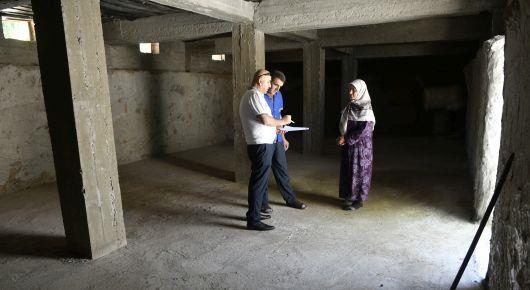Matching grants help operationalize migrant business plans

Forty-one successful winners from Hisor city and Jaloliddini Balkhi district were awarded with matching grants to realize their business plans, which focus on improving agricultural mechanization, dry fruit production, horticulture, greenhouses for lemon and vegetables production, and livestock for milk and meat production. The first grants will be transferred to the recipients starting next week.
The initiative was supported by FAO and the Ministry of Labour, Migration and Employment of Population of the Republic of Tajikistan under a Russian-funded project. Recipients went through a rigorous and competitive selection process that included intensive training sessions on business planning and sector development, which was organized jointly with the regional migration centres of the ministry.
The matching grants are aimed at channelling migrant’s remittances into agricultural production, post-harvest storage, and processing. As the result, they might stimulate market development and innovation, and promote asset-building among low-income segments of communities.
Each agreement includes a business plan, technical conditions, and general provisions acknowledged and endorsed by the FAO representative in Tajikistan. After signing the agreements today, beneficiaries begin the execution stage. FAO, in close collaboration with the ministry and the local authorities, will carefully monitor the assigned grants’ performance and support the entrepreneurs with technical advice.
“The signing of these grant agreements is not only symbolic, but also a moment that reflects hope for farmers and the private sector to increase agricultural investments in rural areas of the country,” emphasized Oleg Guchgeldiyev, FAO Representative in Tajikistan. “It will support sustainable farming, food security, and better nutrition in Tajikistan.”
This activity was carried out under the FAO pilot project “Promoting inclusive economic growth through matching grants” to strengthen food security and nutrition in selected countries of the Caucasus and Central Asia, funded by the Russian Federation. The project intends to promote cross-sectoral collaboration by providing support to effectively pursue and manage coherence between agriculture, nutrition, health, education, and social protection sectors.
Agriculture holds a very special place in Tajikistan’s past and the present. Support for the agriculture sector is an important priority for the Tajik government. The sector holds considerable potential to contribute to the economy and enhance livelihoods of rural households, whose dependence on farming is tremendous.
“This project is at the forefront of our support and we look forward to its success as the sector becomes more vibrant, so that it not only delivers farmer incomes and investments, but uses better technology and innovations,” Guchgeldiyev added. “We hope that the developed mechanism might prove to be a successful example and a model for further replication in the country.”
According to the Central Bank of the Russian Federation, migrant remittances could reach up to USD 2 553 billion in 2018 (17 million more than in 2017) and constitute more than 3.4 percent of the gross domestic product, providing a significant share of income for people in rural areas. Making productive investments into agriculture will help migrants secure sustainable income, as well as improve the rural economy in general.
31 October 2019, Dushanbe, Tajikistan
